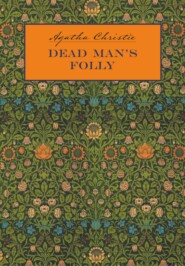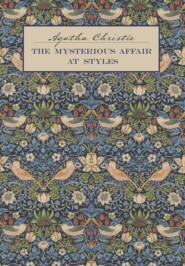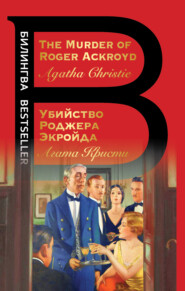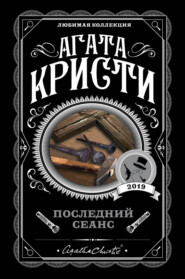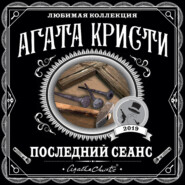По всем вопросам обращайтесь на: info@litportal.ru
(©) 2003-2024.
✖
Hickory Dickory Dock
Автор
Год написания книги
2019
Настройки чтения
Размер шрифта
Высота строк
Поля
‘That was, in fact, so,’ he said. ‘To even the most haphazard assembly of objects one can bring order, and with a little ingenuity, sequence, so to speak. That is: one says to oneself mentally, “With a piece of soap I wash the dirt from a large white marble elephant which stands on a gate-legged table”—and so on.’
Mrs Hubbard said respectfully: ‘Perhaps you could do the same thing with the list of things I’ve given you.’
‘Undoubtedly I could. A lady with her right shoe on, puts a bracelet on her left arm. She then puts on powder and lipstick and goes down to dinner and drops her ring in the soup, and so on—I could thus commit your list to memory—but that is not what we are seeking. Why was such a haphazard collection of things stolen? Is there any system behind it? Some fixed idea of any kind? We have here primarily a process of analysis. The first thing to do is to study the list of objects very carefully.’
There was a silence whilst Poirot applied himself to study. Mrs Hubbard watched him with the rapt attention of a small boy watching a conjurer, waiting hopefully for a rabbit or at least streams of coloured ribbons to appear. Miss Lemon, unimpressed, withdrew into consideration of the finer points of her filing system.
When Poirot finally spoke, Mrs Hubbard jumped.
‘The first thing that strikes me is this,’ said Poirot. ‘Of all these things that disappeared, most of them were of small value (some quite negligible) with the exception of two—a stethoscope and a diamond ring. Leaving the stethoscope aside for a moment, I should like to concentrate on the ring. You say a valuable ring—how valuable?’
‘Well, I couldn’t say exactly, M. Poirot. It was a solitaire diamond, with a cluster of small diamonds top and bottom. It had been Miss Lane’s mother’s engagement ring, I understand. She was most upset when it was missing, and we were all relieved when it turned up the same evening in Miss Hobhouse’s plate of soup. Just a nasty practical joke, we thought.’
‘And so it may have been. But I myself consider that its theft and return are significant. If a lipstick, or a powder compact or a book are missing—it is not sufficient to make you call in the police. But a valuable diamond ring is different. There is every chance that the police will be called in. So the ring is returned.’
‘But why take it if you’re going to return it?’ said Miss Lemon, frowning.
‘Why indeed,’ said Poirot. ‘But for the moment we will leave the questions. I am engaged now on classifying these thefts, and I am taking the ring first. Who is this Miss Lane from whom it was stolen?’
‘Patricia Lane? She’s a very nice girl. Going in for a what-do-you-call-it, a diploma in history or archaeology or something.’
‘Well off?’
‘Oh no. She’s got a little money of her own, but she’s very careful always. The ring, as I say, belonged to her mother. She has one or two nice bits of jewellery but she doesn’t have many new clothes, and she’s given up smoking lately.’
‘What is she like? Describe her to me in your own words.’
‘Well, she’s sort of betwixt and between in colouring. Rather washed-out looking. Quiet and ladylike, but not much spirit or life to her. What you’d call rather a—well, an earnest type of girl.’
‘And the ring turned up again in Miss Hobhouse’s plate of soup. Who is Miss Hobhouse?’
‘Valerie Hobhouse? She’s a clever dark girl with rather a sarcastic way of talking. She works in a beauty parlour. Sabrina Fair—I suppose you have heard of it.’
‘Are these two girls friendly?’
Mrs Hubbard considered.
‘I should say so—yes. They don’t have much to do with each other. Patricia gets on well with everybody, I should say, without being particularly popular or anything like that. Valerie Hobhouse has her enemies, her tongue being what it is—but she’s got quite a following too, if you know what I mean.’
‘I think I know,’ said Poirot.
So Patricia Lane was nice but dull, and Valerie Hobhouse had personality. He resumed his study of the list of thefts.
‘What is so intriguing is all the different categories represented here. There are the small trifles that would tempt a girl who was both vain and hard-up, the lipstick, the costume jewellery, a powder compact—bath salts—the box of chocolates, perhaps. Then we have the stethoscope, a more likely theft for a man who would know just where to sell it or pawn it. Who did it belong to?’
‘It belonged to Mr Bateson—he’s a big friendly young man.’
‘A medical student?’
‘Yes.’
‘Was he very angry?’
‘He was absolutely livid, M. Poirot. He’s got one of those flaring up tempers—say anything at the time, but it’s soon over. He’s not the sort who’d take kindly to having his things pinched.’
‘Does anyone?’
‘Well, there’s Mr Gopal Ram, one of our Indian students. He smiles at everything. He waves his hand and says material possessions do not matter—’
‘Has anything been stolen from him?’
‘No.’
‘Ah! Who did the flannel trousers belong to?’
‘Mr McNabb. Very old they were, and anyone else would say they were done for, but Mr McNabb is very attached to his old clothes and he never throws anything away.’
‘So we have come to the things that it would seem were not worth stealing—old flannel trousers, electric light bulbs, boracic powder, bath salts—a cookery book. They may be important, more likely they are not. The boracic was probably removed by error, someone may have removed a dead bulb and intended to replace it, but forgot—the cookery book may have been borrowed and not returned. Some charwoman may have taken away the trousers.’
‘We employ two very reliable cleaning women. I’m sure they would neither of them have done such a thing without asking first.’
‘You may be right. Then there is the evening shoe, one of a new pair, I understand? Who do they belong to?’
‘Sally Finch. She’s an American girl studying over here on a Fulbright scholarship.’
‘Are you sure that the shoe has not simply been mislaid? I cannot conceive what use one shoe could be to anyone.’
‘It wasn’t mislaid, M. Poirot. We all had a terrific hunt. You see Miss Finch was going out to a party in what she calls “formal dress”—evening dress to us—and the shoes were really vital—they were her only evening ones.’
‘It caused her inconvenience—and annoyance—yes…yes, I wonder. Perhaps there is something there…’
He was silent for a moment or two and then went on.
‘And there are two more items—a rucksack cut to pieces and a silk scarf in the same state. Here we have something that is neither vanity, nor profit—instead we have something that is deliberately vindictive. Who did the rucksack belong to?’
‘Nearly all the students have rucksacks—they all hitch-hike a lot, you know. And a great many of the rucksacks are alike—bought at the same place, so it’s hard to identify one from the other. But it seems fairly certain that this one belonged to Leonard Bateson or Colin McNabb.’
‘And the silk scarf that was also cut about. To whom did that belong?’
‘To Valerie Hobhouse. She had it as a Christmas present—it was emerald green and really good quality.’
‘Miss Hobhouse… I see.’
Poirot closed his eyes. What he perceived mentally was a kaleidoscope, no more, no less. Pieces of cut-up scarves and rucksacks, cookery books, lipsticks, bath salts; names and thumbnail sketches of odd students. Nowhere was there cohesion or form. Unrelated incidents and people whirled round in space. But Poirot knew quite well that somehow and somewhere there must be a pattern. Possibly several patterns. Possibly each time one shook the kaleidoscope one got a different pattern… But one of the patterns would be the right pattern… The question was where to start…
He opened his eyes.
‘This is a matter that needs some reflection. A good deal of reflection.’






